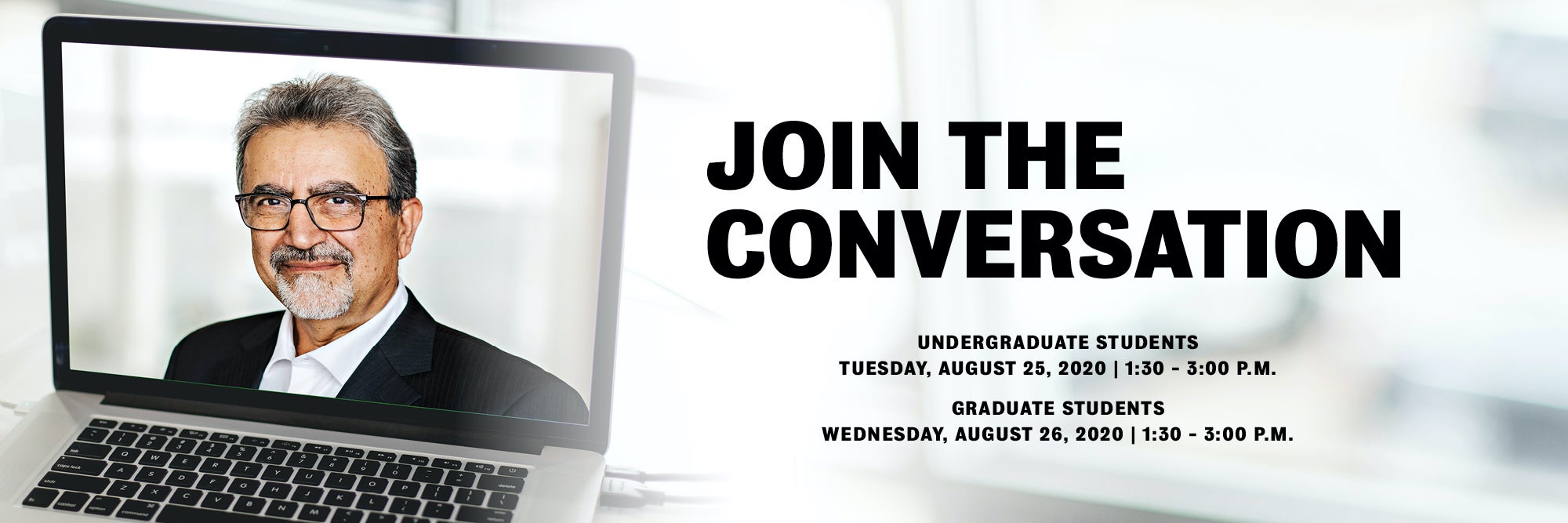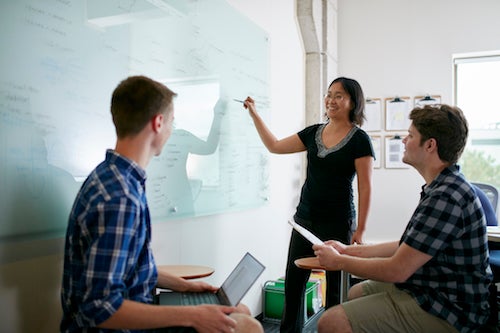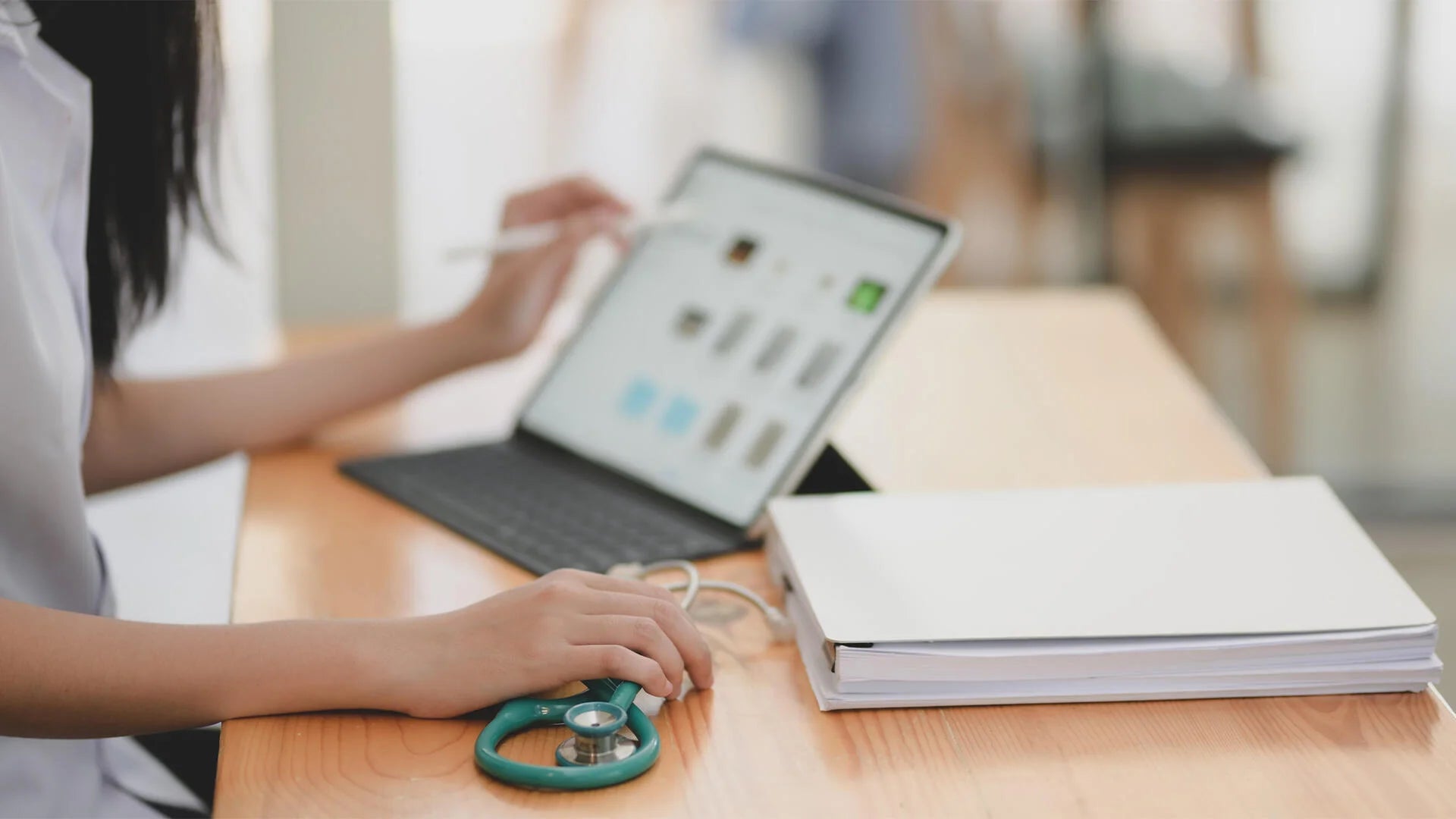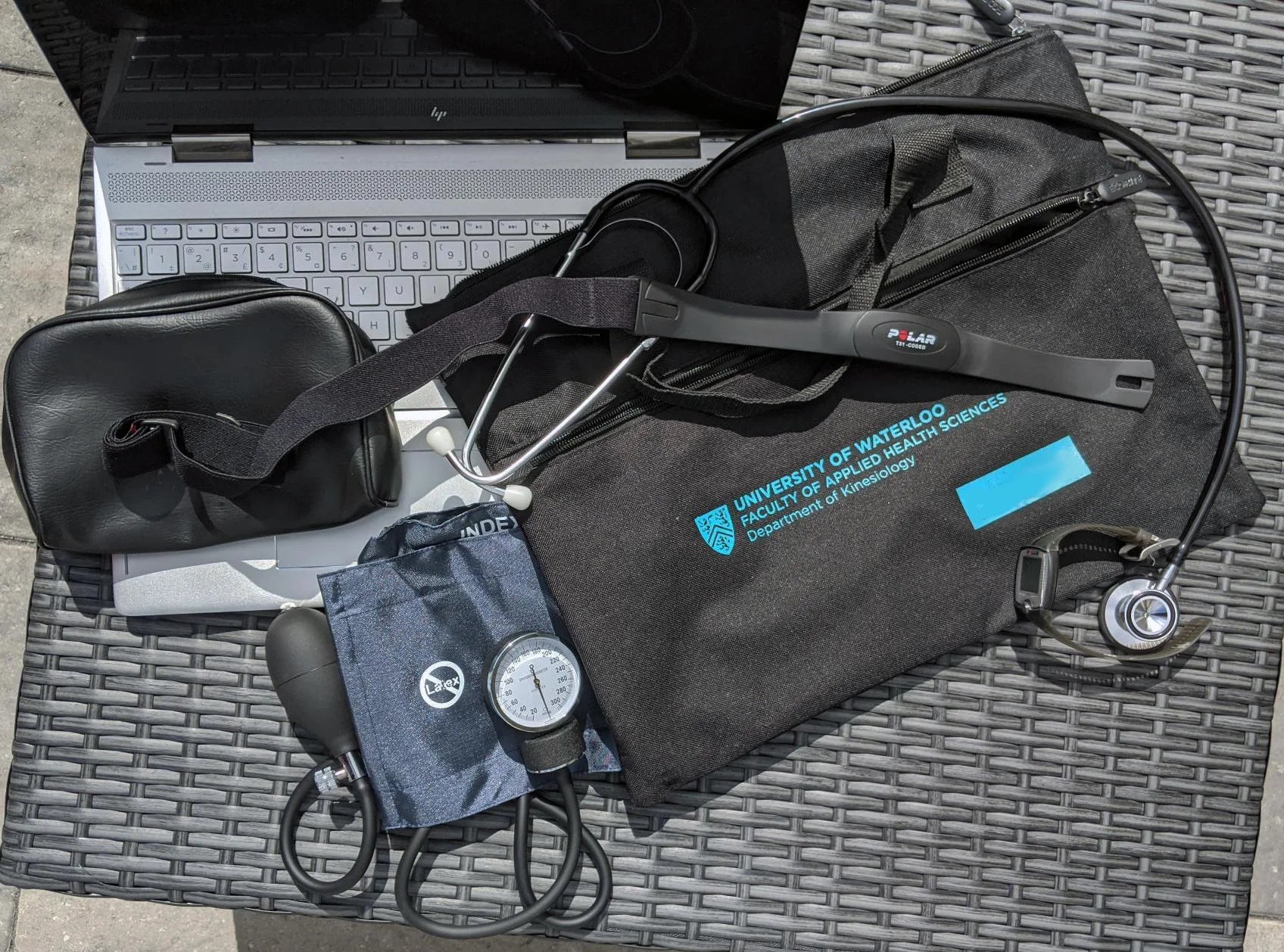Editor:
Brandon Sweet
University Communications
bulletin@uwaterloo.ca
President to host virtual town halls for students

President Feridun Hamdullahpur will be hosting special virtual town hall events for undergraduate and graduate students later this month.
"Our community came together back in May for a special Virtual Town Hall amid a great deal of uncertainty," wrote Hamdullahpur in a recent blog post. "We continue to face a near future that is ever-changing due to the COVID-19 pandemic, but the University of Waterloo community has never stopped planning and acting."
"The Fall Term is fast approaching with new and returning students starting classes. You likely have a number of questions from classes, campus access, research, co-op, student supports and more on the minds of you, our students."
"To help answer some of those questions, I will be hosting two upcoming Virtual Town Hall events, one for our undergraduate students and one for graduate students," the president's blog post continues. "I will be joined by leaders from across our university to listen to your concerns and answer your important questions."
These events, scheduled for August 25 and 26, are intended for students only. Undergraduate and graduate students will receive an email with registration details shortly.
Undergraduate Student Town Hall
- Tuesday, August 25 at 1:30 p.m.
Graduate Student Town Hall
- Wednesday, August 26 at 1:30 p.m.
"As with our past Town Hall event, this event is an opportunity for me to hear from you," President Hamdullahpur writes. "I have had the pleasure to speak with hundreds of students over the last few months and hear their concerns, questions and ideas on a range of topics. I want to hear yours too. I welcome your questions or concerns before the event by pre-registering for the event and also during the live Q&A session."
"I truly want these Town Halls to be an opportunity for our entire community to learn through open dialogue. We are moving forward as we look to ensure your needs as students are met given the challenging environment in which we are living. And, I know that we can only truly move forward together."
Announcing LITE Seed Grant recipients and a new round of LITE Seed Grants

Since 2012, 95 Learning Innovation and Teaching Enhancement (LITE) Seed Grants have been awarded to instructors and staff investigating innovative approaches to enhancing teaching and learning at Waterloo. The Office of the Associate Vice-President, Academic, and the Centre for Teaching Excellence have announced the recipients of the Winter and Spring rounds of LITE Seed Grants.
Winter 2020
- Assessing the effectiveness of a novel wellness check-in activity among third-year pharmacy students, Sherilyn Houle, Heidi Fernandes, Cynthia Richard, Kaitlin Bynkoski and Becky Ewan
- Development and Implementation of a Universal Augmented Reality (AR) App to Enhance Classroom Teaching in Chemistry and Biochemistry, Thorsten Dieckmann and Steve Forsey
- Evaluating and Extending the Reach of the Canadian Design Workshop, Steve Lambert, Ada Hurst and Chris Rennick
- Learning Together: Building Connections between the University of Waterloo and the Walls to Bridges Program, Katherine Bruce-Lockhart
Spring 2020
- Welcome to Canadian Politics: A Student-Generated Open-Access Digital Textbook, Alana Cattapan
- Navigating Choices: Developing an Instructor’s Guide for Introducing Choices into Students’ Learning Activities, Elena Neiterman, Reem Mulla, and Martin Holmes
- A Picture Book is Worth a Thousand Equations: Fostering Mathematical Communication Through Children’s Book Design Projects, Nickolas Rollick
- Examining the Relationship between Undergraduate Students’ Writing Habits, Writing Apprehension, and Writing Self-Efficacy, Nicole Westlund Stewart, Wade Wilson, and Nadine Fladd
A complete list of funded LITE Grant projects is available on the CTE website.
The Centre for Teaching Excellence would also like to announce that an additional LITE Seed Grant round will be held this fall instead of the traditional LITE Full Grant round. This additional round of LITE Seed Grants will be due October 1, 2020 and will adhere to the already established LITE Seed Grant guidelines.
LITE Seed Grants can help you investigate small-scale teaching and learning research projects and attend activities to develop your instructional skills. Please get in touch with Kyle Scholz (kwscholz@uwaterloo.ca) or Kristen Archbell (kristen.archbell@uwaterloo.ca) to discuss a LITE Seed Grant idea you
The making of a virtual lab

By Eugenia Xenos Anderson. This article was originally featured on Waterloo Stories.
When Devon Asemota was a second-year Kinesiology student, he took the Introduction to Exercise Physiology lab and experienced through hands-on learning how to assess an individual’s cardiovascular fitness.
Now in his fourth year, Asemota is preparing that same lab for incoming second-year students who will experience it virtually.
Working as an online learning assistant (OLA), part of a special government program that provided partial funding for co-op students to help transition courses into an online format, Asemota and a team of OLAs are creating videos to mimic real, in-lab experiences.
“The more work I put into this, the better I make the videos, the more the second-years will get from this experience,” Asemota says. “It’s actually been a more fun process than I had expected.”
Asemota predicts the videos will have long-lasting benefits when it comes to making pre-labs more engaging and could continue to be used even when back on campus.
“Before COVID, students had to read a lab manual and complete pre-lab documents before going in to see how things are done for the first time. It obviously took a while to figure out what was what and how things are set up — especially if they hadn’t taken the time to do their readings before the lab.
“This will open it up for visual learners who can watch the video and understand what they have to do in the lab, as well as students who are good at following the lab manual.”
Bringing the lab home
Other Kinesiology students, like those in Bill McIlroy’s lab class on wearable technologies, will receive wearable equipment so they can collect data remotely and run labs using web-based applications to process the information.
This new approach will allow the fourth-year class to physically put into practice the knowledge they are learning in class from the comfort of their homes.

A medical kit called "Kin Kits" will be mailed to more than 250 registered students.
Similarly, the first-year Fundamentals of Kinesiology lab will mail “Kin Kits” to their more than 250 registered students — medical kits equipped with a blood pressure cuff, stethoscope and a goniometer (to measure the body’s joint angles), among other things. The equipment will allow students to conduct tests with those in their immediate “bubbles.” They’ll also have to complement videos to help students through each lesson.
“We’re working hard to try and make this the best learning opportunity that we can,” says Laurie Jones, the class instructor. “These videos will probably be used even once we are back on campus. They’ll be helpful for students to review so they know exactly what’s happening before they go into the lab. They will be a good learning tool.”
She also adds that by working remotely and having access to equipment around the clock, the opportunity for students to strengthen their interpretation and analysis skills will increase.
“They might be far better at interpreting the values and understanding the implications of changing variables because there will be more focus on this.”
It will be unique
Rob Burns, who teaches a fourth-year Kinesiology lab on sports injury evaluation, realizes that while these online lab experiences come with the unchartered territory, the path forward has uncovered learning opportunities to integrate soft-learning skills into hard-data lessons.
“We have developed some new situation analysis tools to help students practice their critical reasoning: the ability to think through informative assessments that they can practice on their own with no stakes or marks, which they can do on their own time.”
These unique learning practices will also offer professors and instructors a new method of connecting with and evaluating students.
“Students will have to do hands-on exercises that we will assess virtually, trying to pick up any issues they might have while doing the testing on individuals in their bubbles.
“It might be more challenging for us professors or instructors to correct techniques they have to perform, but it will give students the ability to view and review videos we’ve provided so that they can go back and correct themselves,” he says. “It will also give them the opportunity to test on people they are comfortable with. That is unique as well.”
In the end, Asemota has some advice for students taking online labs. “See which topics interest you that you didn’t know about before. Keep an open mind, and you will get a lot out of this experience.”
Link of the day
10 years ago: Scott Pilgrim vs. the World
When and Where to get support
Students can visit the Student Success Office online for supports including academic development, international student resources, leadership development, exchange and study abroad, and opportunities to get involved.
Instructors can visit the Keep Learning website to get support on adapting their teaching and learning plans for an online environment. The following workshops are current offerings from the KL team (CTE, CEL, ITMS, LIB):
Getting Ready to Facilitate Online Courses: TA Training, beginning July 13.
Assessment Design Café, Thursday, August 13, 1:30 p.m.
NEW - Active Learning Online Part 1, Monday, August 17, 1:00 p.m.
NEW - Active Learning Online Part 2, Thursday, August 20, 1:00 p.m.
Employees can access resources to help them work remotely, including managing University records and privacy of personal information
Interested in learning more about engaging your students in an online course? The Centre for Extended Learning has created a new resource for you called "Fostering Engagement: Facilitating Online Courses in Higher Education"
ThisOpen Educational Resource was designed for post-secondary instructors and teaching assistants who would like to better understand the critical role of facilitation in online course delivery, and build practical skills and strategies that are relevant, effective, and authentic.
Here are some tips for staying healthy while working from home.
The Writing and Communication Centre has gone virtual. We have many online services to help you meet your goals, including: Virtual Pre-booked and Drop-in appointments, Online workshops, Virtual Grad and Faculty Writing Cafés, Instagram Live Q&A sessions, Live PJ-Friendly Write-ins, Online learning resources, and Online programming for Master’s and PhD students. Whatever you’re working on, we’re here to help! Visit our website for more information.
We understand that these circumstances can be troubling, and you may need to speak with someone for emotional support. Good2Talk is a post-secondary student helpline based in Ontario, Canada that is available to all students.
If you feel overwhelmed or anxious and need to talk to somebody, please contact the University’s Campus Wellness services, either Health Services or Counselling Services. You can also contact the University's Centre for Mental Health Research and Treatment.
The Library has published a resource guide on how to avoid information overload.
The Faculty Association of the University of Waterloo (FAUW) continues to advocate for its members. Check out the FAUW blog for more information.
The University of Waterloo Staff Association (UWSA) continues to advocate for its members. Check out the UWSA blog for more information.
WUSA supports for students:
Food Support Service food hampers are currently available from the Turnkey Desk on weekdays from 9:00 a.m. to 4:00 p.m. in the Student Life Centre. If you have any questions please email us at foodsupport@wusa.ca.
MATES – Providing general online Peer Support via Skype to undergraduate students. To set up an appointment, please go to: https://wusa.ca/peersupport
Glow Centre - Providing online Peer Support for the LGBTQ2+ community via Skype to Undergraduate students. To set up an appointment, please go to: https://wusa.ca/peersupport
The Women’s Centre– Providing online Peer Support via Skype to undergraduate students. To set up an appointment, please go to: https://wusa.ca/peersupport
RAISE– Providing online Peer Support via Google to undergraduate students. To set up an appointment, please go to: https://wusa.ca/peersupport
The Bike Centre – Now open by appointment for your bicycle repair and rental needs in the Student Life Centre. For more information or to schedule an appointment, please go to: https://wusa.ca/bikecentre
Centre for Academic Policy Support - CAPS is here to assist Waterloo undergraduates throughout their experience in navigating academic policy in the instances of filing petitions, grievances and appeals. Please contact them at caps@wusa.ca. More information at http://wusa.ca/caps
WUSA Commissioners who can help in a variety of areas that students may be experiencing during this time:
- Equity – equity@wusa.ca
- Co-op and Experiential Affairs – coop.affairs@wusa.ca
WUSA Student Legal Protection Program- Seeking legal counsel can be intimidating, especially if it’s your first time facing a legal issue. The legal assistance helpline provides quick access to legal advice in any area of law, including criminal. Just call 1-833-202-4571.
Empower Me is a confidential mental health and wellness service that connects students with qualified counsellors 24/7. They can be reached at 1-844-741-6389.
When and Where (but mostly when)
Healthy Warriors at Home. Free programming including Online Fitness, Personal Training, Health Webinars, Personalized Nutrition and more. Open to students, staff, faculty and alumni. Register today.
Waterloo Warriors Online Hockey Skills Camps. Designed to provide a fun, inclusive and safe atmosphere where youth can take part in skill development and team building. Age 7-9 and 10-12. Only $50/week and includes 5 x 1 hour sessions. Register today.
Warriors Basketball Web Workouts. Register today to gain access to online content that is guaranteed to help you improve your basketball skills; regardless of your current skill level. Open to all ages. New content added weekly throughout the year for only $100. Register today.
Warriors Big 6 Summer Challenge. Weekly challenges from July 13 to August 23 focusing on Movement, Sleep, Hydration, Nutrition, Apps and Choose your own adventure. Post your photo and tag @WlooRec on Instagram for a chance to win a $100 box from truLOCAL each week as well as $100 from Mel’s Diner for our grand prize winner. Stay healthy Warriors!
Engineering Our Way Through a Pandemic: How Waterloo Engineers are Finding Solutions, Thursday, August 13, 1:00 p.m. Part of the Engineering Alumni Speaker Series, this virtual event is open to everyone. A Zoom link will be sent to registrants.
NEW - IT Seminar: Confluence and IST Knowledge Base, Friday August 14, 9:00 a.m. to 9:45 a.m. Join online.
CBB-[CREATE Series]- Engagement with the FDA on Premarket Submissions and Inspections by Yuan Fang], Friday, August 14, 2:00 p.m. to 3:00 p.m. Online via Webex.
QPR Mental Health Training for Students, Monday, August 17, 1:30 p.m., Microsoft Teams – Register on GoSignMeUp.
Waterloo Innovation Summit, Wednesday, August 19, 9:00 a.m.
A conversation about Indigenizing annual performance reviews, Wednesday, August 19, 1:00 p.m. Register for access.
Public Lecture, “Will our kids be alright?”Tuesday, August 25, 7:00 p.m. to 8:30 p.m.
PhD oral defences
Combinatorics and Optimization. Luis Antonio Ruiz Lopez, "Smoothening Functions and the Homomorphism Learning Problem." Supervisor, David Jao. Thesis available from MGO - mgo@uwaterloo.ca. Oral defence Friday, August 14, 9:00 a.m.
Applied Mathematics. Giselle Sosa Jones, "Space-time hybridizable discontinuous Galerkin methods for free-surface wave problems." Supervisor, Sander Rhebergen. Thesis available from MGO - mgo@uwaterloo.ca. Oral defence Monday, August 17, 8:00 a.m.
History. Yelena Abdullayeva, "Crafting the Modern Woman in Azerbaijan: Muslim Women, the State, and Modernity, 1900-1939." Supervisor, Renee Worringer. On deposit in the Arts Graduate Office (PAS 2428). Oral defence Tuesday, August 18, 9:00 a.m.
Computer Science. Vedat Levi Alev, "Higher Order Random Walks, Local Spectral Expansion, and Applications." Supervisor, Lap Chi Lau. Thesis available from MGO - mgo@uwaterloo.ca. Oral defence Tuesday, August 18, 1:00 p.m.
Statistics and Actuarial Science. Fei Meng, "Valuation and Risk Management of Hedge Fund Investments under Alternative Fee Structures." Supervisor, David Saunders. Thesis available from MGO - mgo@uwaterloo.ca. Oral defence Thursday, August 20, 2:00 p.m.